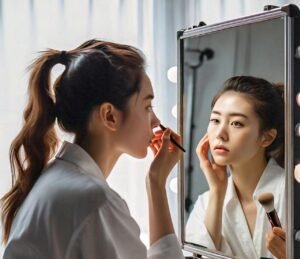The Impact of Makeup on Skin Health
Makeup has become an integral part of many people’s daily routines, allowing individuals to express themselves creatively and enhance their features. However, it’s essential to understand the potential effects of makeup on skin health, particularly in terms of acne, pore-clogging, eye health, skin sensitivity, allergic reactions, and the risks associated with expired products.
Exploring the Impact of Makeup on Skin Health: Insights into Acne and Pore-Clogging

Makeup can affect your skin, from acne breakouts, to being healthy on different occasions, because of the ingredients in makeup products, how you look at them, and how you are perceived. Bar makeup arrives
1. Ingredients: Some makeup products contain ingredients that are comedogenic, meaning they have the ability to clog pores and break out acne. These ingredients may include certain oils, waxes and emollients. It’s important to choose makeup that’s labeled “non-comedogenic” or “oil-free to minimize pore clogging.”
2. Frequency of Use: Wearing makeup every day can increase the chances of clogged pores and acne breakouts, as dirt, oil, and dead skin cells can become trapped and lead to breakouts. Giving your skin a break from makeup and exercise can help with problems.
3. Aspiration Techniques: Applying makeup with dirty forceps or brushes can introduce bacteria to the skin and other acne-prone skin conditions. Before applying makeup, it is important to use clean tools and wash your hands.
4. Removal Process: Failing to remove makeup well during the day, the makeup residue left on the skin at night to close up and contribute to acne, alternates with sweat and oil. , prevents further breakouts and definitely works against breakouts. First cleanse your skin thoroughly to remove all traces of makeup.
5. Skin Type: Skin types react differently to makeup. People with oily or acne-prone skin may be more prone to breakouts and breakouts from certain makeup products than those with dry or sensitive skin. When choosing makeup products it’s important to consider your skin type and look for formulations that are specific to your skin.
Overall, although makeup can improve your appearance, it’s important to reverse its effects on your skin’s health. Choosing non-comedogenic products, practicing good hygiene, and giving the skin a break from exercise can help reduce breakouts and breakouts.
Examining Makeup Practices and Their Potential Impact on Eye Health: Risks of Eye Infections and Related Concerns
Yes, there are several makeup-related habits or behaviors that can potentially lead to eye infections or other eye health problems:
1. Sharing makeup: Sharing eye makeup products such as mascara or eyeliner can transfer bacteria or viruses between people, increasing the risk of eye infections.
2. Expired Products: Using expired eye makeup can lead to bacterial growth, which can cause eye infections. Always check the expiration dates on makeup products and discard them if they are past their prime.
3. Using dirty brushes or applicators: Dirty makeup brushes or applicators can harbor bacteria and other microbes. Be sure to clean your brushes regularly and avoid using them if they look dirty.
4. Sleeping with makeup: Leaving eye makeup on overnight can clog the pores around your eyes and increase the risk of eye infections or irritation.
5. Using waterproof makeup: Waterproof eye makeup products often contain more chemicals and are difficult to remove, causing eye irritation or sensitivity.
6. Applying makeup in a hurry or on the go: Applying makeup in a hurry can increase the chances of accidentally touching your eye with the makeup applicator, which can cause bacteria or injury.
7. Using Unsanitary Storage Containers: Storing makeup products in unsanitary conditions, such as a humid bathroom environment or in direct sunlight, can promote bacterial growth.
8. Ignoring Allergic Reactions: If you experience any redness, itching or swelling after applying eye makeup, it could be a sign of an allergic reaction. Ignoring these symptoms and continuing to use the product can lead to more serious eye problems.
To reduce the risk of eye infections or other eye health problems, practice good hygiene, clean your makeup tools regularly, avoid sharing makeup, and keep these products in mind. It is important to keep what you use around your eyes. If you experience persistent eye irritation or discomfort, consult a healthcare professional.
The Relationship Between Makeup and Skin Sensitivity: Exploring Allergic Reactions and Sensitivity Risks

Wearing makeup can actually affect skin sensitivity and increase the likelihood of allergic reactions, depending on a variety of factors such as the ingredients in the makeup products, the individual skin type, and how the makeup is applied and applied. is removed.
1. Ingredients: Many makeup products contain various chemicals and compounds that can cause irritation or allergic reactions in some individuals. Common allergens found in makeup include fragrances, preservatives (such as parabens), colors, and certain metals (such as nickel). It’s important to check the ingredient list and be aware of any known allergens.
2. Skin Type: People with sensitive skin are more prone to adverse reactions to makeup. People with conditions like eczema, rosacea, or acne may find that some makeup aggravates their symptoms or causes flare-ups. It’s important to choose makeup formulated for sensitive skin or to patch test new products before using them extensively.
3. Application and Removal: The method of applying and removing makeup can also affect skin sensitivity. Harsh application techniques, such as excessive rubbing or using dirty makeup brushes, can irritate the skin. Likewise, improper removal methods or leaving makeup on overnight can clog pores and lead to breakouts or irritation.
4. Frequency of Use: Frequent use of makeup, especially if it contains potentially irritating ingredients, can gradually increase skin sensitivity over time. Giving your skin a break from makeup can help reduce the risk of developing a sensitivity or allergic reaction.
5. Hygiene: Keeping makeup tools and products clean is very important to prevent bacterial growth and contamination, which can lead to skin problems. Wash your brushes, sponges and other applicators regularly, and avoid sharing makeup with others to reduce the risk of infection or allergic reactions.
6. Product Quality: High quality makeup products contain fewer potentially harmful ingredients and are less likely to cause adverse reactions. Investing in reputable brands known for their hypoallergenic or dermatologist-tested formulations can help reduce the risk of skin sensitivity and allergic reactions.
Overall, while makeup can enhance one’s appearance, it’s important to keep in mind its potential impact on skin health. Careful product selection, awareness of personal sensitivities, and maintaining good skin care practices can help reduce the risk of adverse reactions. If you experience persistent irritation or allergic reactions, it is advisable to consult a dermatologist.
The Health Hazards of Expired Makeup: Strategies for Ensuring Product Safety and Mitigating Risks
Expired makeup products can pose several health risks due to changes in their composition over time. Some potential risks include:
1. Bacterial Growth: Expired makeup can become a breeding ground for bacteria, leading to infections such as conjunctivitis, skin irritation, or even more serious conditions.
2. Skin Irritation: Ingredients in makeup products can degrade over time, causing changes in texture, color, and fragrance. This degradation may cause skin irritation or allergic reactions when applied.
3. Eye Infections: Mascara and eyeliner are especially prone to harboring bacteria, which can lead to eye infections such as pink eye (conjunctivitis) or styes.
4. Acne Breakouts: Expired face makeup like foundation or concealer can clog pores and contribute to acne breakouts.
To ensure product safety, individuals can take the following precautions:
1. Check Expiry Dates: The shelf life of most makeup products is indicated on their packaging. Pay attention to the dates and discard products that have expired.
2. Inspect the product regularly: Even if a product has not reached its expiry date, it is still important to check its texture, smell and appearance for deterioration or degradation. Monitor for any symptoms.
3. Practice good hygiene: Wash your hands before applying makeup to prevent bacteria from getting into your products. Additionally, clean makeup brushes and applicators regularly to minimize the risk of contamination.
4. Store Products Properly: Keep makeup products away from direct sunlight and extreme temperatures, as these can accelerate degradation. Close lids and caps tightly to prevent air and bacteria from entering.
5. Avoid Sharing Makeup: Sharing makeup with others can transfer bacteria and increase the risk of infection. Use your own products and avoid using testers in stores if possible.
6. Use Preservative Free Products: If you prefer natural or organic makeup, be aware that these products may have a shorter shelf life due to the absence of artificial preservatives. Be aware of their expiration dates and signs of deterioration.
By following these guidelines, individuals can help reduce the health risks associated with expired makeup products and ensure that their beauty routines remain safe and enjoyable.
Deciphering the Effects of Makeup on Skin Barrier Function: Strategies for Supporting Skin Health Amidst Makeup Use

Makeup can have different effects on the skin’s natural barrier function, depending on the ingredients in the makeup products, how they are applied, and how often they are worn. Here are some ways that makeup can affect the skin’s barrier function:
1. Clogging pores: Some makeup products contain ingredients like oils and waxes that can clog pores, leading to breakouts and inflammation. This can compromise the skin’s natural barrier function by allowing bacteria to easily penetrate the skin.
2. Dehydration of the skin: Some makeup products, especially those containing alcohol or mists, can strip the skin of its natural oils, leading to dehydration and compromised barrier function. happens. Dry skin is more prone to irritation and sensitivity.
3. Allergic reactions: Makeup products can cause allergies or irritations that can trigger allergic reactions or irritate the skin, leading to inflammation and impaired barrier function.
4. Excessive Exfoliation: Some makeup products, especially those with exfoliating properties such as certain foundations or powders, can cause excessive exfoliation if used frequently. Excessive exfoliation can damage the skin’s barrier function by damaging the skin’s protective outer layer.
To support skin health while wearing makeup, individuals can take several steps:
1. Choose Makeup Wisely: Choose makeup products that are non-comedogenic (will not clog pores) and hypoallergenic (less likely to cause an allergic reaction). If you have sensitive skin, look for products labeled “oil-free” or “fragrance-free.”
2. Cleanse well: Cleanse your skin properly both morning and night to remove makeup, dirt and impurities. Use a gentle cleanser that won’t strip the skin of its natural oils.
3. Moisturize regularly: Hydrate your skin with a moisturizer suitable for your skin type to help maintain its natural barrier function. Look for moisturizers that contain ingredients like hyaluronic acid, glycerin or ceramides to help plump and protect the skin.
4. Use Sunscreen: Apply a broad-spectrum sunscreen with SPF 30 or higher daily, even if your makeup products contain SPF. Sunscreen helps protect the skin from harmful UV rays, which can weaken the skin’s barrier function and cause premature aging.
5. Take Makeup Free Days: Give your skin a break from makeup every now and then so it can breathe and heal. It can help prevent clogged pores, irritation and other problems associated with prolonged makeup wear.
6. Practice good hygiene: Wash your makeup brushes and sponges regularly to prevent bacteria build-up, which can lead to breakouts and skin irritation.
By being mindful of the makeup products you use and following a consistent skincare routine, you can support your skin’s natural barrier function and overall health, even while wearing makeup. .
Conclusion
In conclusion, the impact of makeup on skin health is a multifaceted and complex topic. While makeup can be a powerful tool for self-expression and confidence, it’s essential to be mindful of its potential effects on the skin, including acne, eye health, skin sensitivity, and the skin’s natural barrier function. By choosing makeup products that are non-comedogenic, hypoallergenic, and free from harsh chemicals, individuals can mitigate the risks and support their overall skin health. Additionally, practicing proper makeup hygiene, being mindful of expired products, and incorporating skincare routines that strengthen the skin’s barrier and microbiome can help maintain the health and resilience of the skin. By understanding the nuances of makeup and its impact on skin, individuals can make informed choices and enjoy the benefits of makeup while prioritizing their skin’s well-being.
